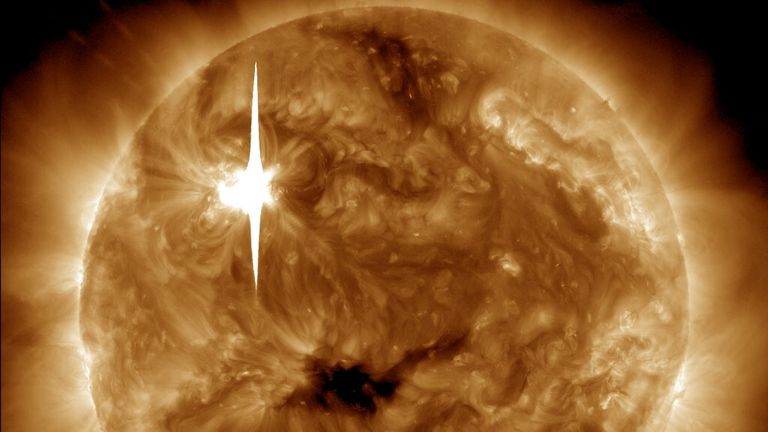NASA is preparing for an “unprecedented opportunity” to study how solar storms and radiation could affect future astronauts on Mars.
The sun is entering a period of peak activity called solar maximum, which occurs roughly every 11 years. During this period, giant explosions erupt on the sun’s surface – including solar flares and coronal mass ejections.
When a series of these solar events erupts, it’s called a solar storm, and these launch radiation deep into space.
While we’re protected on Earth due to the planet’s magnetic field, Mars lost such defences long ago, leaving the Red Planet more vulnerable to the sun’s energetic particles.
Scientists still don’t know how badly solar storms will affect humans and robots on Mars in the future but they’re hoping to figure that out during these solar storms thanks to NASA’s MAVEN (Mars Atmosphere and Volatile EvolutioN) orbiter and the Curiosity rover.
MAVEN, which entered the Red Planet’s orbit in 2014, observes radiation, solar particles and more from high above Mars.
It can detect big solar flares early from its position, and can therefore send warnings to other Mars spacecraft teams when radiation levels begin to rise.
The advanced notice enables missions to turn off instruments that could be vulnerable to solar flares, which can interfere with electronics and radio communication.
Meanwhile, the Curiosity rover, which has been on Mars since 2012, is on the ground gathering data through its Radiation Assessment Detector (RAD).
RAD is helping scientists understand how much shielding from radiation astronauts could expect by using caves, lava tubes, or cliff faces for protection.
It analyses how radiation breaks down carbon-based molecules on the surface, a process that could affect whether signs of ancient microbial life are preserved there.
During these solar storms, MAVEN’s team will be letting the Curiosity team know when they detect a big solar flare so they can watch for changes in RAD’s data.
It’s a team effort that should allow scientists to learn more about how hospitable Mars really is, so space agencies can then decide what kind of radiation protection astronauts would require.
This could be crucial for determining how humans might live on Mars in the future.
To really test the dangers Mars might pose, scientists are hoping for some brutal storms in the latest ‘solar maximum’ period in the coming months.
Shannon Curry, principal investigator for NASA’s MAVEN team, said: “For humans and assets on the Martian surface, we don’t have a solid handle on what the effect is from radiation during solar activity.
“I’d actually love to see the ‘big one’ at Mars this year – a large event that we can study to understand solar radiation better before astronauts go to Mars.”



























